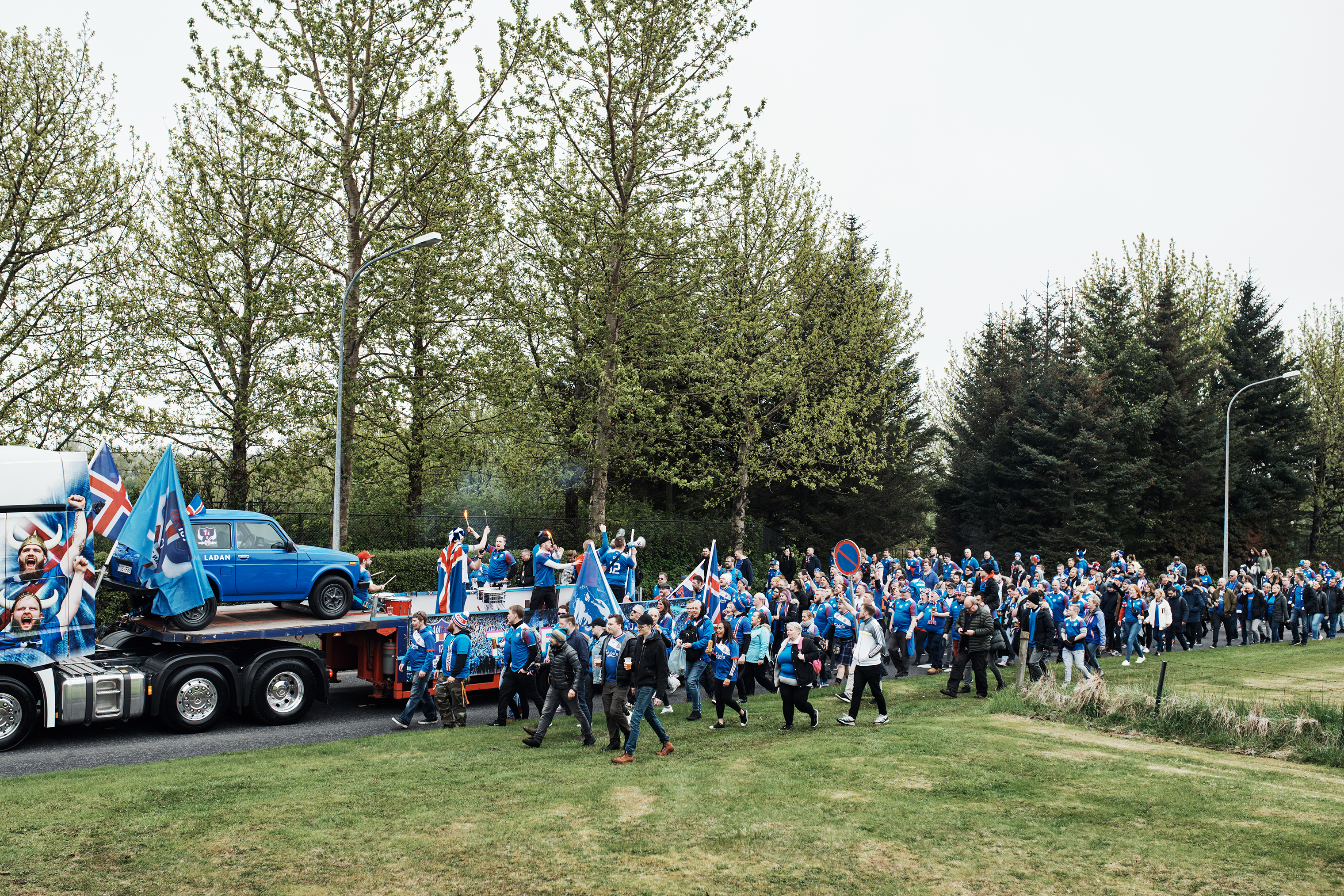The hopes of an entire soccer-mad nation will soon be riding on the hands of Hannes Thór Halldórsson. But on this chilly morning in late May, Iceland’s goalkeeper uses his powerful mitts not to stop a blast from Lionel Messi but to gently tap the tiny shoulder of a Reykjavík kindergartner. Halldórsson asks the boy, who’s wearing a blue Iceland soccer jersey and has his country’s flag painted on both of his cheeks, to move a little to his right. Halldórsson then glides back across the floor — shoes off in the classroom, even for national team stars — and peeks at the video camera. Now the shot looks better.
He would know. Until about four years ago, when he finally received a professional soccer contract to play in Norway, Halldórsson, 34, was a full-time filmmaker. So when Coca-Cola sought a director for its World Cup commercial in Iceland, the smallest country ever to qualify for the World Cup — its population, about 350,000, is barely bigger than that of Corpus Christi, Texas — the team’s goalie got the nod.
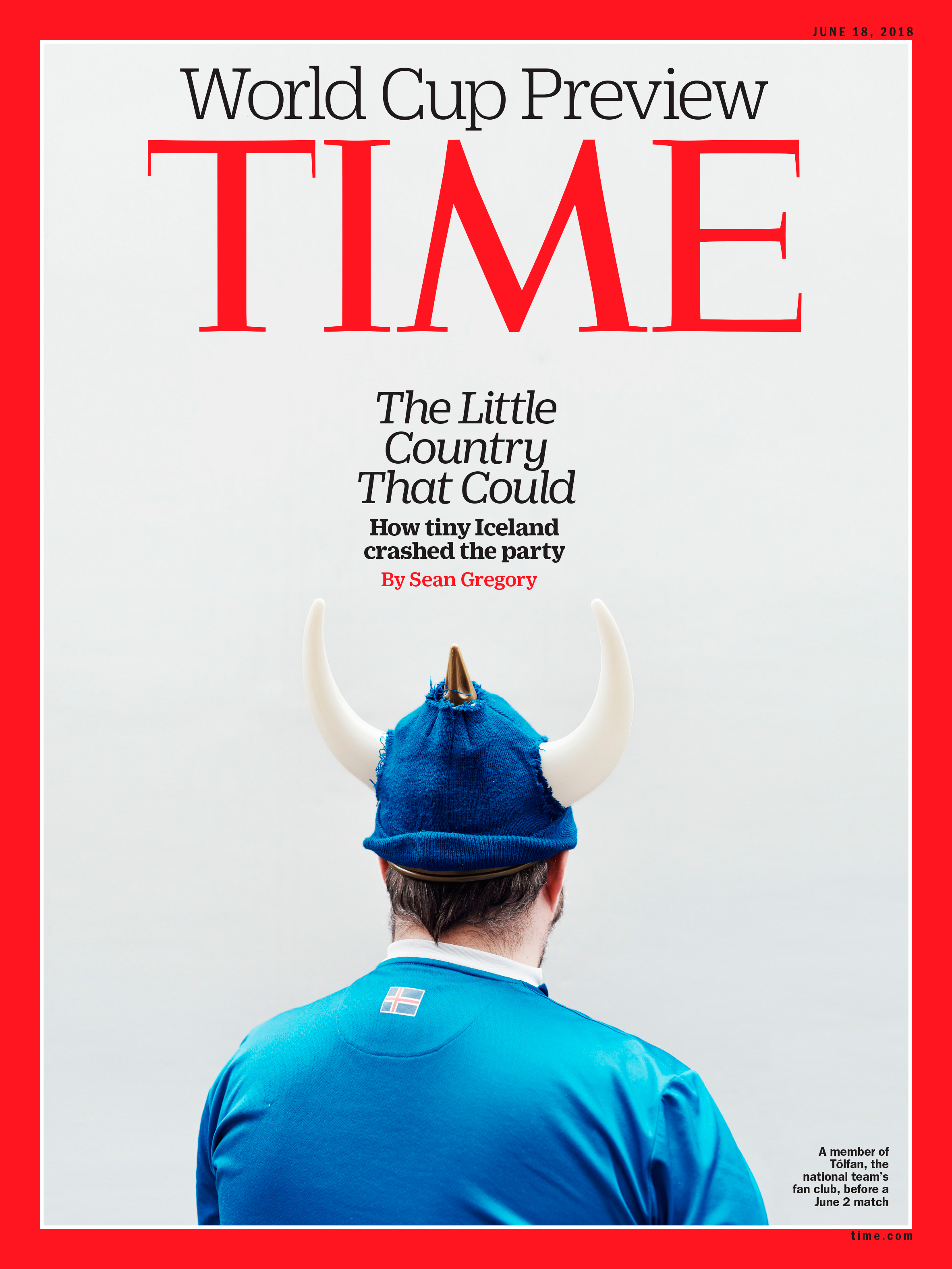
“Typical Iceland,” says Halldórsson. Indeed. While some other players in the 32-nation World Cup field may hold side jobs, no top-flight team looks quite like this one. Iceland’s coach doubles as a dentist. One of the defenders delivers salt. The team’s nickname is Strákarnir Okkar, which translates to “Our Boys.” In a country this small, everyone has a stake.
That’s why just three weeks before the start of the world’s most prestigious tournament, Halldórsson is imploring a bunch of 6-year-olds to do the “Viking clap,” a mesmerizing chant involving two drumbeats, a moment of silence, and then a resounding woo as fans pound their hands together over their heads. “Who can yell the loudest?” Halldórsson shouts to the giggling, out-of-breath kids in Icelandic. “Who can clap the loudest?”
The chant was made famous at the 2016 European Championships, when Iceland made an improbable run to the quarterfinals in its first-ever major international tournament in men’s soccer. That stunning showing — which included a draw with Portugal and an upset of mighty England — was the culmination of a 20-year investment in soccer, including building new, accessible and affordable facilities across the country and educating hundreds of youth coaches on the proper way to teach the game.
The current members of the national team benefited from that commitment, and it shows on the pitch. While Iceland has relatively few players in the world’s top professional leagues, the squad displays a patient, selfless style that has foiled higher-ranked teams.
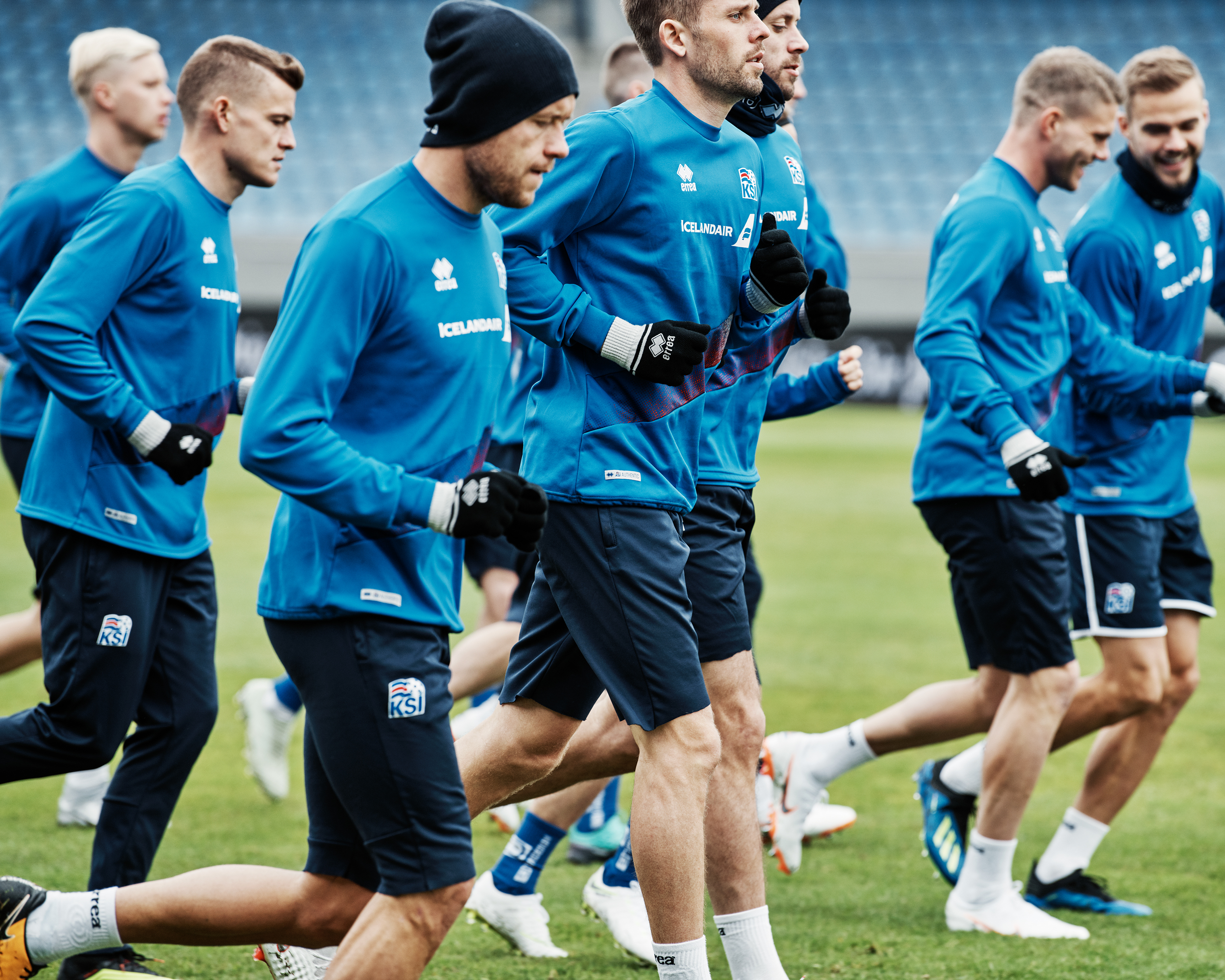
The combination of Iceland’s national investment in soccer and its appeal as the ultimate underdog has sent expectations soaring ahead of its first World Cup match, in Moscow on June 16 against Argentina. The Argentine soccer legend Diego Maradona said recently that Iceland has a shot at beating the two-time World Cup champs. “Wow,” Halldórsson says, reading the quote on his phone. “Maradona is thinking about Iceland.”
Among the rabid fans in Reykjavík, the World Cup offers an opportunity to show that Iceland stands for more than Instagram-ready glaciers and volcanoes, and a banking collapse that nearly crushed the country during the 2008 financial crisis. Adding to the pressure on the team is that virtually the entire nation will be watching: during the European Championships two summers ago, 99.8% of Icelanders who were watching television at the time of the England upset were tuned in to the game.
“You have to be careful to judge the quality of a society by sporting success,” Iceland President Gudni Jóhannesson tells TIME during an interview from Bessastadir, his windswept official residence. “Having said that, for a small nation like Iceland in a globalized world, it’s so important to tell us, and the outside world, that we can punch above our weight.”
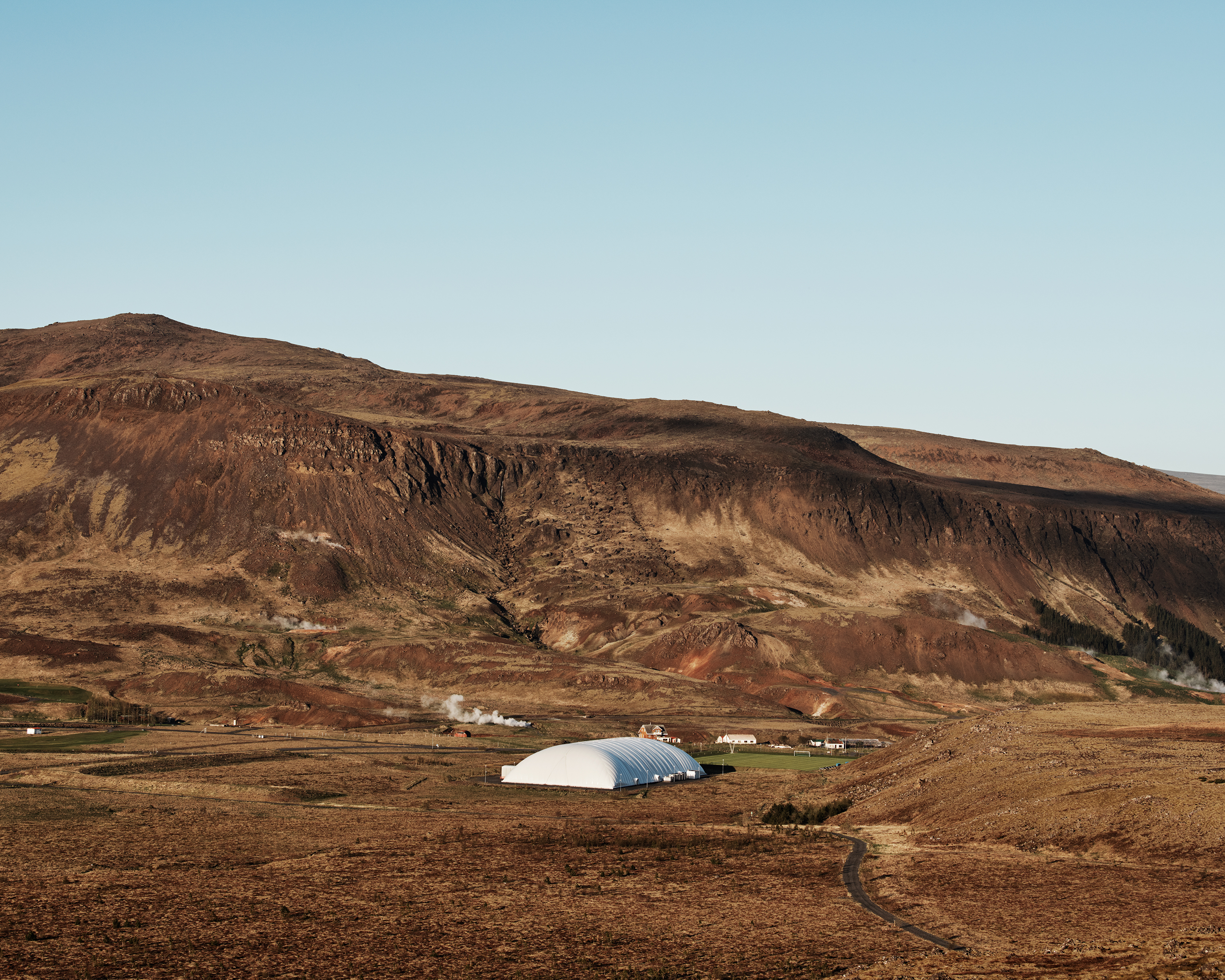
How did Iceland, which a decade ago was losing games to microstates like the Faroe Islands (pop. 49,000) and Liechtenstein (pop. 38,000), arrive on the doorstep of the World Cup? Take a ride to Breidablik, a sports club in a suburb of Reykjavík, for clues. There, on a soaked spring day, about 100 boys and girls are practicing in one of Iceland’s vast indoor soccer halls under the supervision of professionally licensed coaches. Towns across the country started building such facilities around the turn of the century so that kids could play unbothered by Iceland’s unforgiving weather.
One group of 8-year-old boys dribble around cones; a coach works with about a dozen others on lateral quickness. Another group plays a game while a coach stands to the side, saying nothing; just letting kids play is a deliberate training tactic. “You need to give them space to express themselves,” says Hákon Sverrisson, head of youth soccer at Breidablik and a former math teacher.
Four members of Iceland’s World Cup team played on Breidablik’s indoor pitch, which opened in 2002. Overall, 13 purpose-built indoor facilities have popped up across the country in the past two decades. Turning soccer into a year-round sport has improved Iceland’s raw talent.
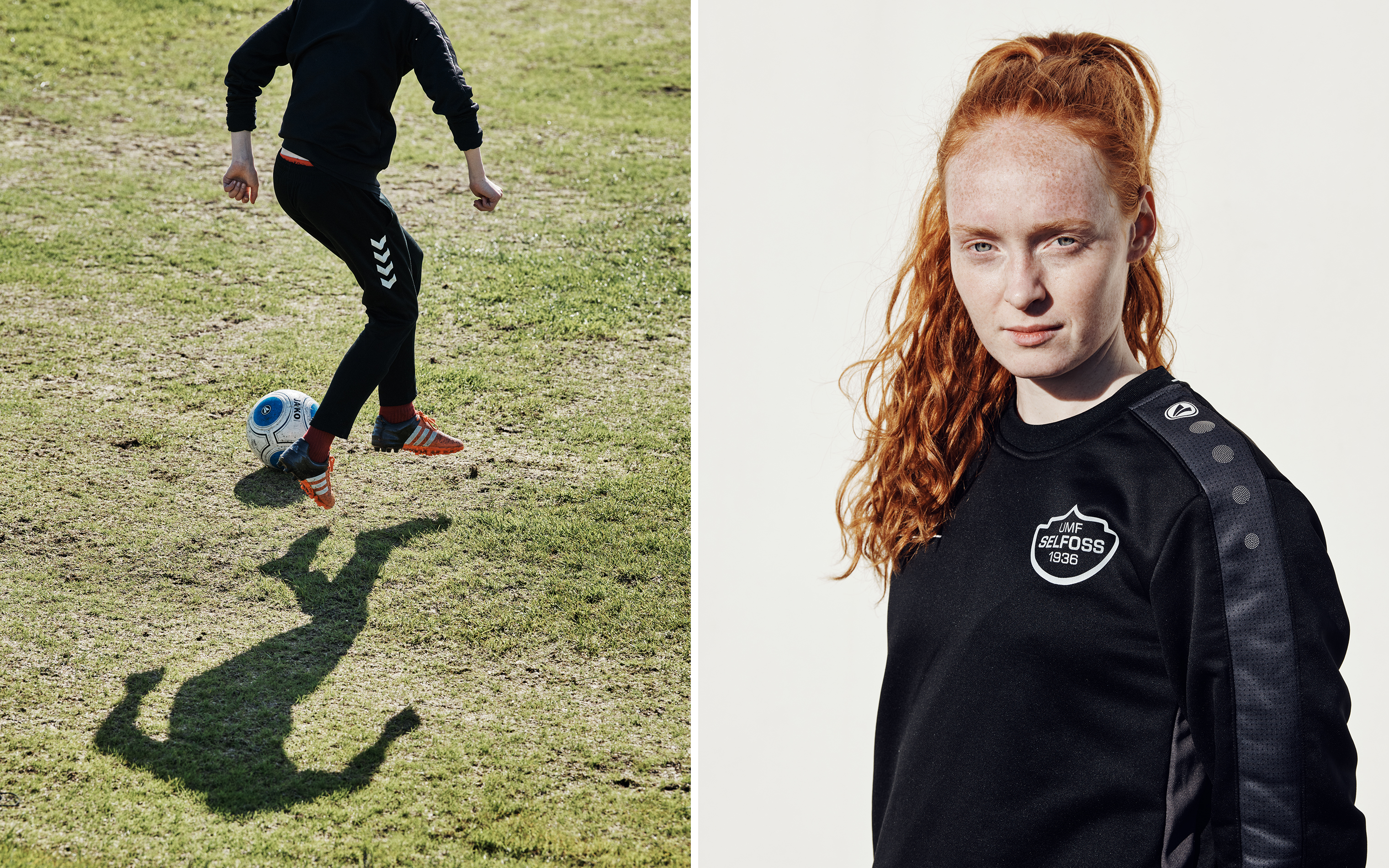
What’s more, Iceland spent the riches generated by soccer’s global popularity to expand access to the game, rather than on perks for the country’s sports brass. TV-rights money helped finance the construction of some 150 smaller artificial pitches, many with a heating system that can melt snow, near schools. These fields give kids ample opportunity to kick the ball around whenever the mood strikes. “I often think that the reason I made it this far was just playing by myself, really,” says Iceland forward Jón Dadi Bödvarsson, who grew up in Selfoss, a town of about 7,000 people some 45 minutes southeast of the capital. “That’s one of the best trainings as a kid, when you’re having fun with your mates.”
A culture that mixes free play with coaching expertise can produce startling results. Fifteen years ago, no Icelandic coaches held the “A” or “B” license awarded to the most qualified instructors by the Union of European Football Associations. Now Iceland has 716 such coaches, up 87% over 10 years and 27% over five years. Moreover, this top-notch instruction is widely available, and not just offered to those with the most talent or deepest pockets.
In Iceland, anyone can join a local sports club that employs elite coaches, for an average of $600 a year. The local government subsidizes the fees, covering anywhere from a third to half of the cost. Since the towns finance the facilities, the club dues pay the coaches; some are full-time employees of the club, while others hold day jobs (among them: teachers, computer scientists, janitors and a purchasing manager at the local car dealership). This system phases out volunteer parents, who often lack both coaching qualifications and a comfortable perspective on the abilities of their own children. There is surely a lesson there for the U.S., which relies on a pay-to-play youth soccer model and more than its share of screaming parents serving as coaches, and failed to qualify for the World Cup for the first time in 32 years.
Iceland’s sports-for-all philosophy has paid off beyond its run to the World Cup. Research has shown that organized-sports participation, which has doubled among adolescents in Iceland since the early 1990s, is linked to improved academic performance and self-esteem, and reductions in childhood smoking and alcohol abuse. “If you keep kids active in organized sports, you’ll have better health outcomes for them,” says Kári Jónsson, head of sports and recreation for the town of Gardabaer, where construction on a new $40 million indoor soccer hall is set to begin in September. “Not just physical health, but mental and social too. That’s why everything pays back into the community.”
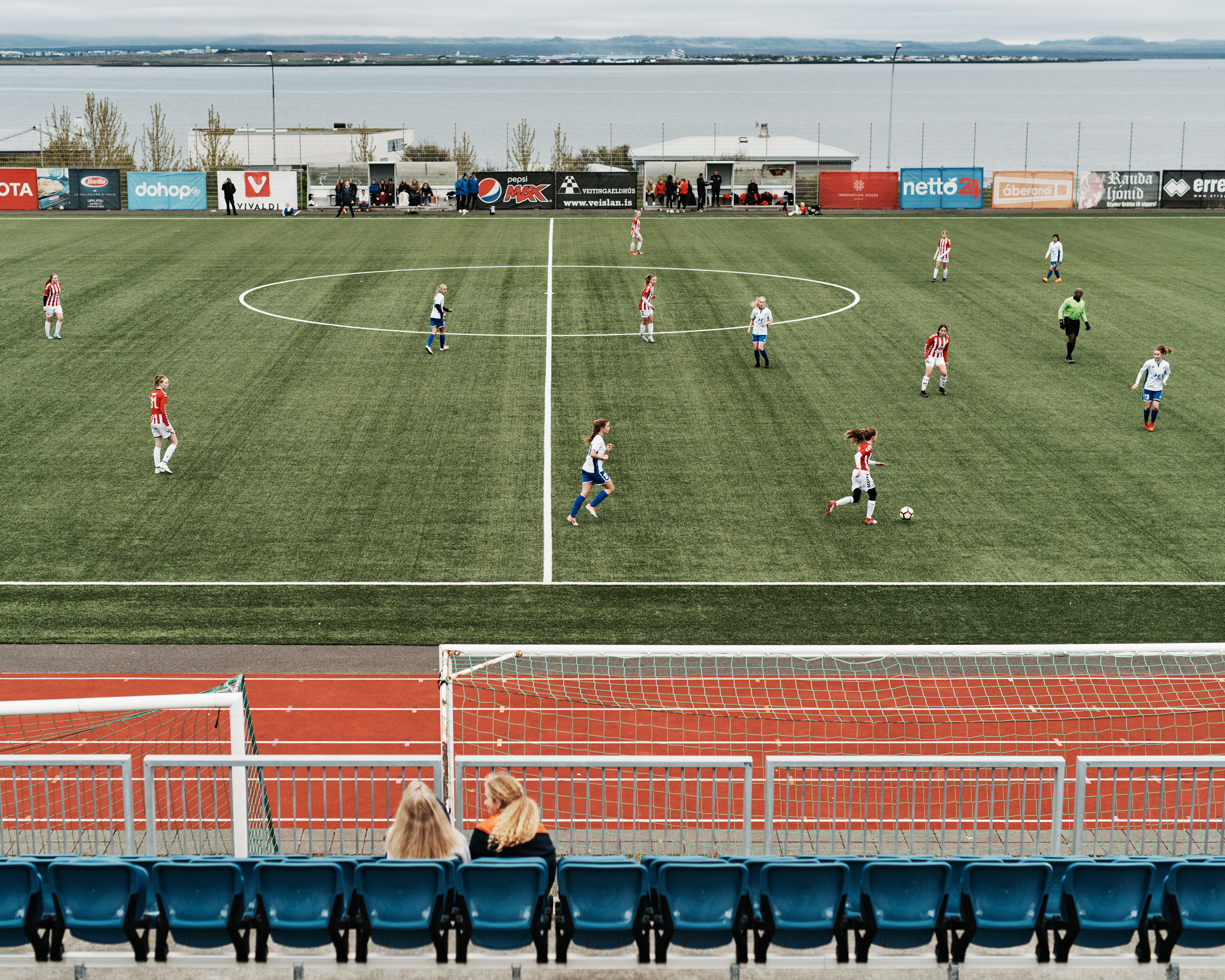
Meanwhile, Iceland’s elite players develop their talents at a steady, arguably saner pace. Iceland doesn’t have a full-fledged professional league, so young stars don’t decamp to specialized academies at a young age and burn out. Since the local clubs offer a variety of sports, most kids try a few out — basketball and handball are also popular — before focusing on one around age 14 or 15. Playing multiple sports rounds out an athlete’s motor skills and can help kids thrive in soccer in the long term.
Still, Iceland’s sporting culture is not completely egalitarian. The top players do eventually break away from their local towns, and the best of them sign contracts with overseas professional teams and hone their skills abroad. (Top leagues in Denmark, Norway and Sweden are popular stops.) “We’ve become more professional,” says University of Iceland sociologist Vidar Halldórsson, who wrote the 2017 book Sport in Iceland: How Small Nations Achieve International Success. “But not too professional.”
While Iceland refined its grassroots soccer system, the football federation in 2011 hired Lars Lagerbäck — who guided Sweden to two World Cups and Nigeria to one — as the national team coach. Lagerbäck commanded immediate respect and molded the country’s emerging talent; two years later, Iceland fell one playoff victory short of making the 2014 World Cup. In the group stage of the 2016 European Championships, Iceland forced a draw with eventual champ Portugal, which features superstar Cristiano Ronaldo, and shocked England in the knockout round to advance to the quarterfinals. “That was one of the biggest surprises in the history of the European Championships,” says former FIFA World Player of the Year Lothar Matthäus, a World Cup commentator for Fox Sports.
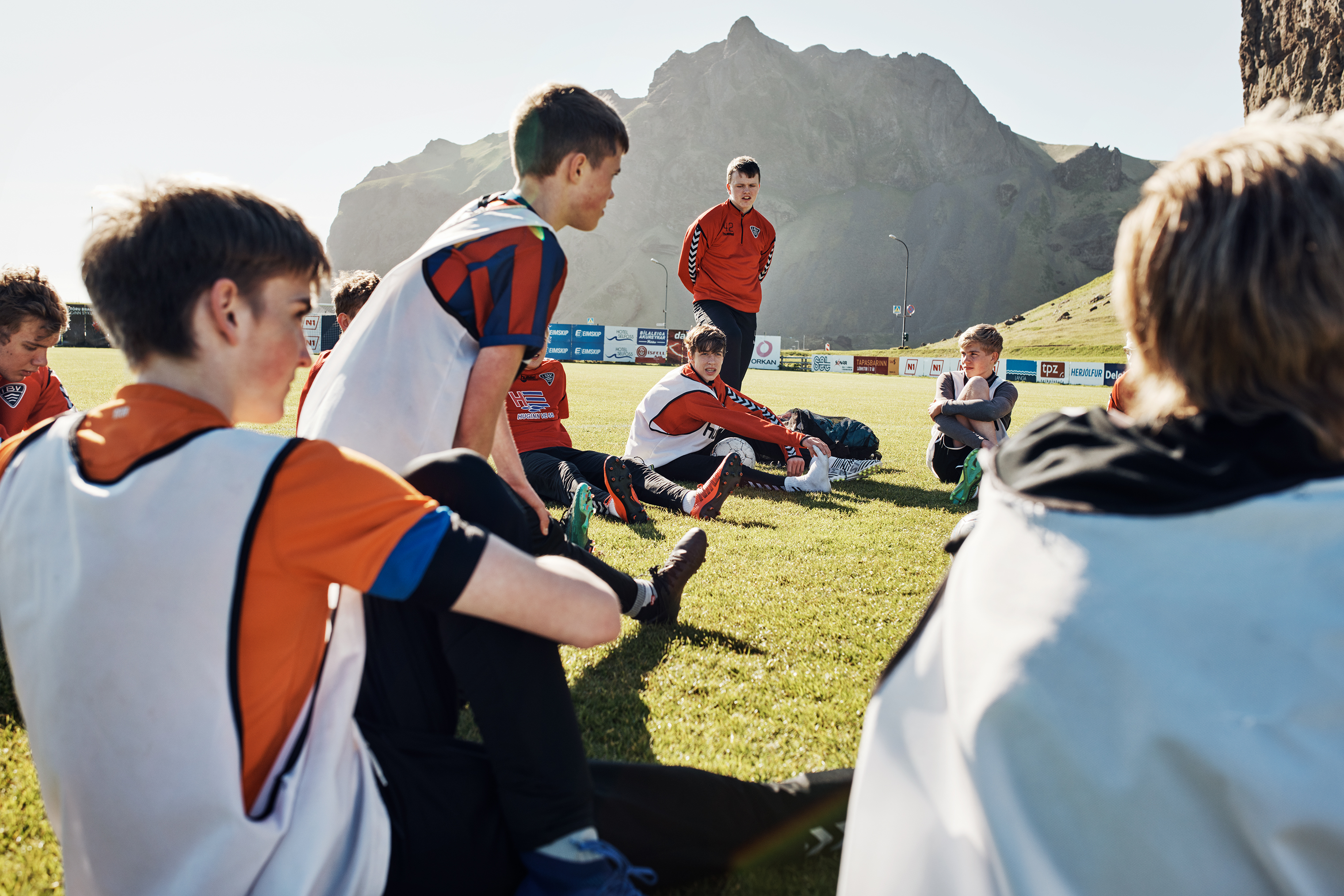
After the Euros, Lagerbäck, who said he was satisfied with the team’s unprecedented success, handed the reins to former assistant Heimir Hallgrímsson. A dentist who has coached men’s, women’s and youth teams at his local club in Vestmannaeyjar, an archipelago off Iceland’s southern coast, Hallgrímsson is surely the only international soccer coach to be featured on the Colgate toothpaste blog. His everyman status has endeared the coach to his countrymen. “You know the world of football coaches, where you wake up tomorrow and don’t have a job?” says Hallgrímsson. “Don’t apply to me.”
Hallgrímsson has guided Iceland through World Cup qualification and rising expectations. But the homespun trappings remain. At an early-May press conference naming the 23-man roster for Russia, the first question came from a man who wondered why a certain goalkeeper didn’t make it. Turns out this inquisitor wasn’t a member of the media. Rather, he was the keeper’s father-in-law.
In an attempt to drum up public support after he joined Iceland’s staff in 2011, Hallgrímsson pledged to meet with representatives from Tólfan, the national team’s fan club, at a pub near the team’s stadium before every home game. He offered to preview the starting lineup and share tactical insights with the superfans. Tólfan, which roughly translates to “12th man,” was then all but dead. At the first meeting, seven fans showed up.
Now, even as the head coach of a World Cup squad, Hallgrímsson has continued the pregame gatherings at the pub. “If you sing, if you wear the national shirt, you deserve a little bit extra from us,” he says. Hundreds of fans now pile into the bar to hear Hallgrímsson. Many have been guzzling Viking beer for hours, but they hush as the coach speaks from a stage.
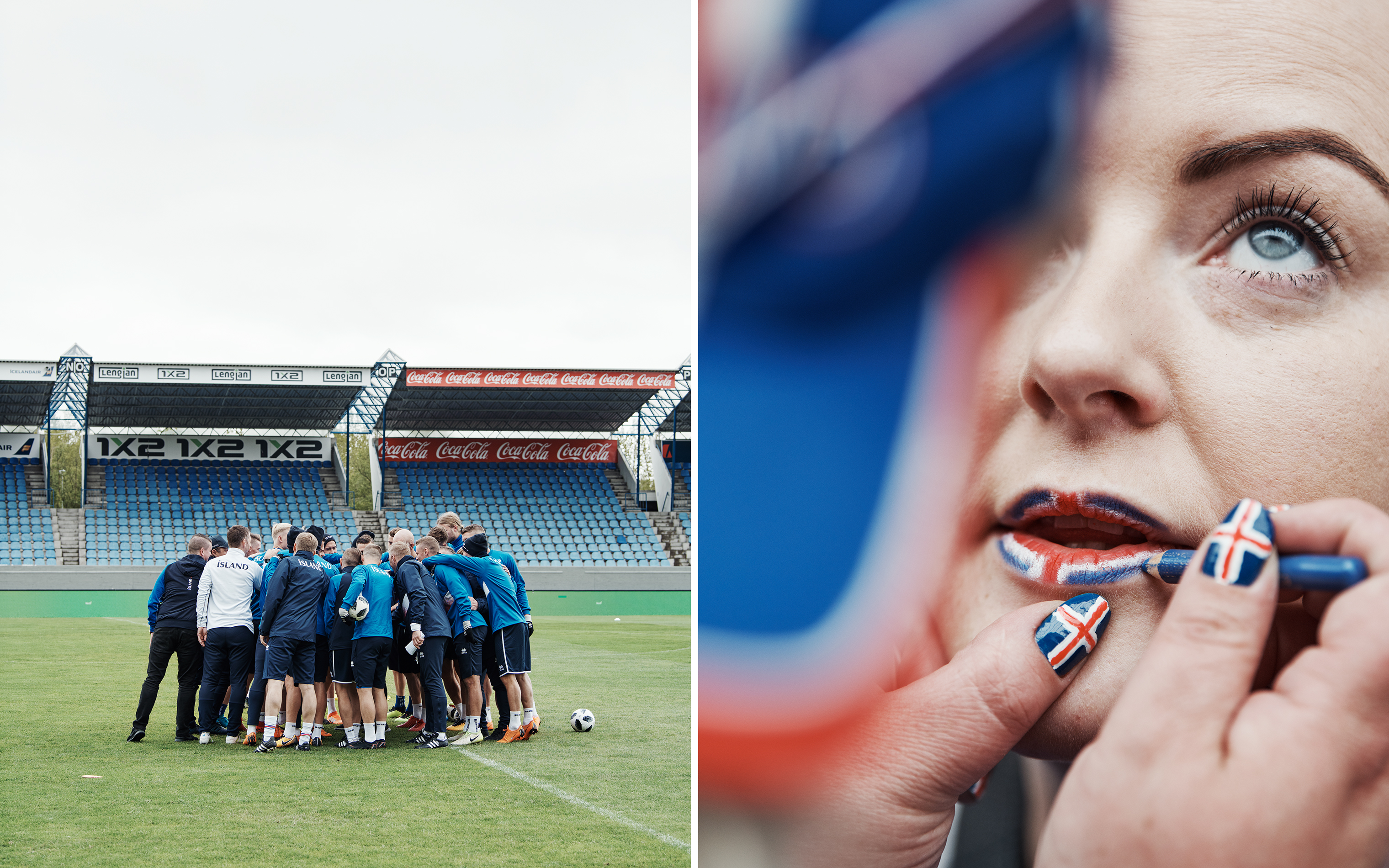
Hallgrímsson’s loyalty to Iceland’s supporters have helped fans form an especially tight bond with their team. Iceland’s supporters bought 27,000 tickets — a number equal to 8% of the country’s population — to the 2016 Euros in France. While the longer trip to Russia might shrink the traveling party at the World Cup, Iceland will surely make its presence felt, Viking clap and all. Kristinn Hallur Jónsson, Tólfan’s treasurer, assures it. “Ronaldo was a nice appetizer,” says Jónsson, slamming his hand against a barroom table as he recalls the draw with Portugal in France. “Messi is going to be a great main course.”
That may be more than the Viking talking. Maradona isn’t the only veteran soccer hand to call Iceland a dark horse. Matthäus predicts that Iceland will survive group play against Argentina, Nigeria and Croatia and advance to the knockout round. “Iceland can only surprise,” he says.
At the Euros, Ronaldo complained about Iceland’s deliberate style, calling it a sign of a “small mentality.” But the team doesn’t have the talent to play a faster possession game and string together pretty passes. “If we were to try to play like Spain,” says Hallgrímsson, “we’d be a bad replica of Spain.”
So Iceland will stick to its plan, no matter the size of the stage. Counterattack after an opponent makes a mistake. Capitalize on set pieces such as corner kicks and throw-ins, which are easier to perfect with practice. Bank on technically gifted midfielder Gylfi Sigurdsson, whom Everton of the English Premier League purchased from another club for $58 million last summer, to make an impact. “People call it sh-tty football, boring football,” says Iceland defender Ari Freyr Skúlason. “But it works for us.”
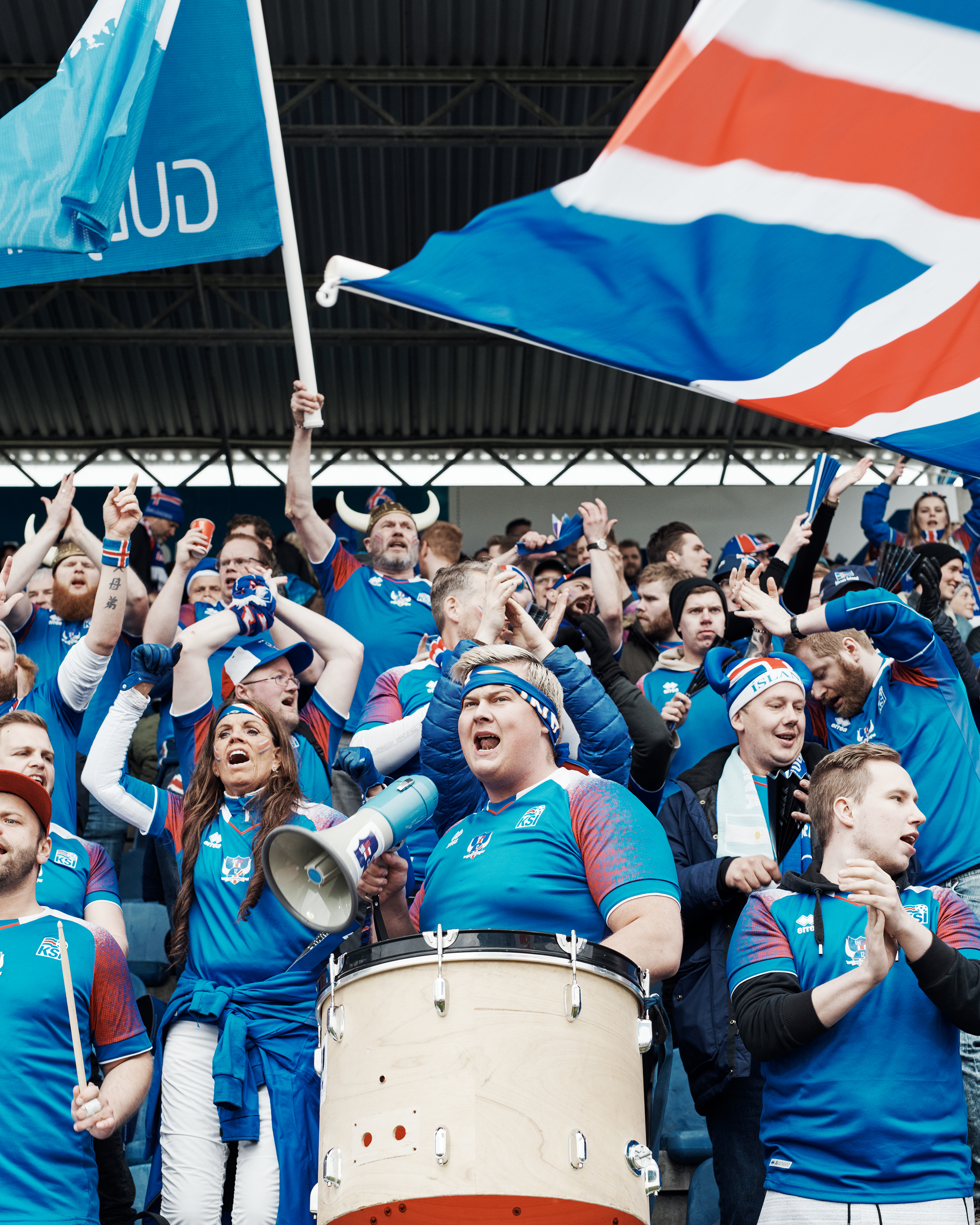
As long as Iceland keeps knocking off World Cup favorites, its fan base will keep growing. The players are well aware, for example, that more than 300 million Americans don’t have a home team in this World Cup. They hope that U.S. fans will adopt Our Boys as their own. “Americans like the underdog,” says Iceland defender Birkir Már Saevarsson, who spent part of this season making deliveries for a Reykjavík salt distributor. “It’s a big thing in the movies,” he says. “The Mighty Ducks, for example.”
Or Iceland could get a movie of its own. It already has the director. “There are many things to like about our team,” says Halldórsson, the filmmaker turned world-class goalie. “We don’t have any big stars. We’re playing for the love of football, love of country. You can feel the joy we’re bringing our supporters. There’s purity to it. It’s football at its most beautiful.”
Halldórsson then puts on his shoes, heads to his car and drives away from the kindergarten classroom. A storybook World Cup awaits.
- Donald Trump Is TIME's 2024 Person of the Year
- Why We Chose Trump as Person of the Year
- Is Intermittent Fasting Good or Bad for You?
- The 100 Must-Read Books of 2024
- The 20 Best Christmas TV Episodes
- Column: If Optimism Feels Ridiculous Now, Try Hope
- The Future of Climate Action Is Trade Policy
- Merle Bombardieri Is Helping People Make the Baby Decision
